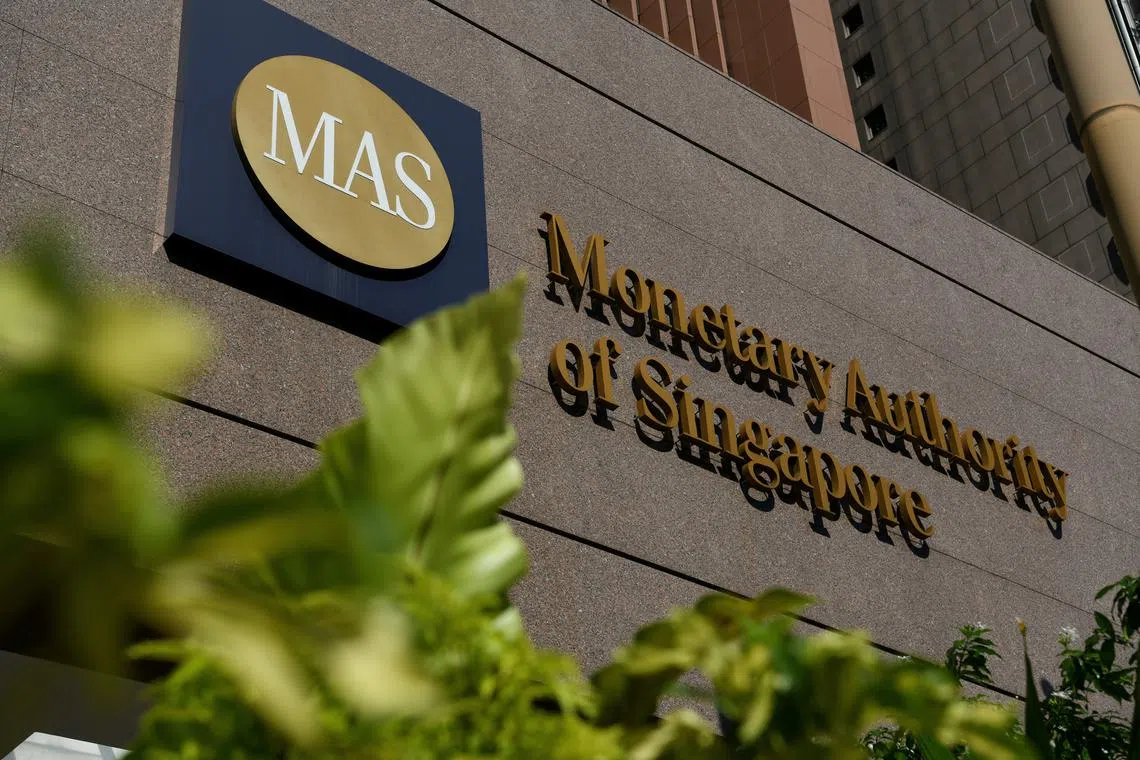MAS-led Project Guardian adds five more pilots in asset tokenisation
Sign up now: Get ST's newsletters delivered to your inbox

MAS is working with the financial industry to develop ways to scale tokenised markets.
ST PHOTO: SHINTARO TAY
SINGAPORE - Five new pilot programmes on asset tokenisation will be added to a government initiative that explores the use of blockchain in institutional digital assets trading.
The Monetary Authority of Singapore (MAS), which leads the initiative also known as Project Guardian,
The five new industry trials would test promising asset tokenisation use cases.
MAS said the trials would potentially pave the way for integration across the capital markets value chain, including listing, distribution, trading, settlement and asset servicing.
Lender Citi and investment management firms T Rowe Price Associates Inc and Fidelity International are using blockchain to price and execute bilateral digital asset trades efficiently. The trial will also explore real-time post-trade reporting.
Mr Sam Hewson, Citi’s head of foreign exchange sales, said: “We are taking steps towards building foundational capabilities to offer liquidity, pricing and risk management to our global clients wherever they choose to trade – be it on traditional rails or on blockchain.”
Lenders BNY Mellon and OCBC Bank are trying out a cross-border foreign exchange payment product to enable secure payment across networks of different origins.
Financial services giant Ant Group is testing a treasury management solution that will enable real-time multi-currency clearing and settlement through its Singapore global treasury centre.
Asset manager Franklin Templeton is looking to issue a tokenised money market fund through a variable capital company (VCC) structure that uses digital asset networks. A VCC is a corporate structure for investment funds that provides flexibility in the issuance and redemption of shares.
JP Morgan and asset manager Apollo are working on the use of digital assets to enable seamless investment and management of portfolios and alternative assets, as well as automated portfolio rebalancing. The goal is to reduce time used in manual processes for asset servicing.
Besides the five new pilot projects, MAS said it is launching a new funds work stream. This would be set up within Guardian’s industry group that is focused on the native issuance of VCC funds on digital asset networks.
The work stream aims to address tax, policy and legal issues while increasing distribution channels for asset managers.
MAS said it would work with the Accounting and Corporate Regulatory Authority to better assess the opportunities and risks of adopting digitally native VCC fund shares.
In addition, MAS is collaborating with international policymakers and financial institutions, including DBS and Mitsubishi UFJ Financial Group, to explore the design of an open, digital infrastructure of international standard.
The initiative, known as Global Layer One (GL1), would have the infrastructure host tokenised financial assets and applications.
It would facilitate seamless cross-border transactions and enable tokenised assets to be traded across global liquidity pools, while adhering to regulations.
MAS is also working with the financial industry to develop an interlinked network model (INM). The INM is a common framework for exchanging digital assets across independent networks. It enables financial entities to transact with one another without the need for all of them to be on the same network.
A White Paper that sets out how an INM may be applied in practice and the design considerations for its implementation was published on Wednesday.
Meanwhile, the International Monetary Fund (IMF) has joined Guardian’s policymaker group comprising policymakers from Japan, Singapore, Switzerland and the United Kingdom.
“IMF will provide an international perspective on the policies and legal issues that would facilitate cooperation around cross-border platforms and preserve the stability of the international monetary system,” MAS said.
The regulator’s deputy managing director for markets and development Leong Sing Chiong said Guardian’s industry trials have successfully demonstrated that tokenised financial assets such as fixed income, foreign exchange and asset management products can be traded, distributed and settled seamlessly across borders.
“To fully realise the potential of tokenised markets and achieve network effects, a scalable digital infrastructure is needed,” he said.
To this end, Mr Leong added that GL1 will provide a foundational digital backbone and bring markets together with similar principles of openness and accessibility as the public Internet.
Meanwhile, UBS, SBI and DBS said they launched the world’s first live repurchase transaction, also commonly known as repo, with a natively issued digital bond on a public blockchain.
Conducted as part of Guardian, the transaction automatically and instantly settled a repo, digital bond purchase and redemption using regulated digital payment tokens, across regulated entities located in Japan, Singapore and Switzerland.



